Private equity has traditionally been a male domain. Only one in ten leading positions in the industry worldwide is filled by a woman. Lenna Koszarny is one of them. As CEO of the private equity firm Horizon Capital, the Canadian with Ukrainian roots manages the Emerging Europe Growth Fund III, in which KfW subsidiary DEG holds equity investments. In addition the 49-year-old takes every opportunity to increase the share of women in management positions.
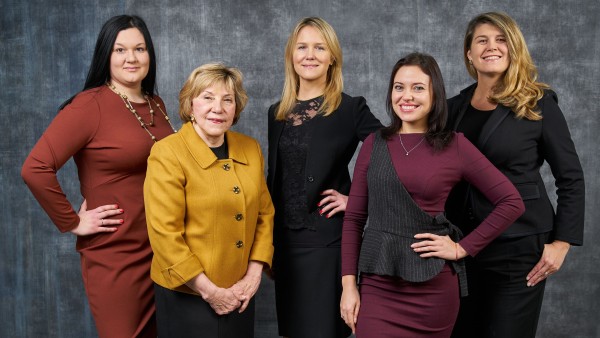
Personal information
Lenna Koszarny (on the right in the Ukraine House Davos) is CEO of Horizon Capital, a leading private equity firm in Ukraine. She advocates for women to form networks and to assume leadership roles. The Canadian with Ukrainian roots has lived in Ukraine with her husband and her children for 25 years.
You are a founding partner of Horizon Capital and have been the CEO for many years. Do you face challenges that have to do with you being a woman in this position?
LENNA KOSZARNY: I am proud that Horizon Capital is a woman-led private equity firm and believe that each member of our team adds to our success, both women and men. In terms of my personal experience, I cannot say that I have been in situations where I felt outwardly discriminated against. What I do know is that there have been studies done about fund raising. If a woman gives exactly the same pitch as a man, then two thirds of respondents are more likely to react positively if the pitch is delivered by the man versus a third for the woman. So who knows? Maybe there was that kind of discrimination when we were raising the Emerging Europe Growth Fund III (EEGF III) though we ultimately reached the hard cap for the fund, the maximum we could raise.
Well, your example proves that these prejudices need to be overcome.
Absolutely. For the new fund, we orginally set a target size of 150 million US dollars. We raised 200 million. Obviously, investors are backing us, they are backing a woman-led private equity firm.
After finishing university and achieving a profession as a Certified Public Accountant, you left the comfort of your home country, Canada, to start a career in the Ukraine. Why did you decide to do that?
My grandmother Olena is the reason why. She wanted to come to Ukraine after the Sovjet Union fell apart to visit her family and she asked me to bring her. And so I did. I travelled to Ukraine with her in August 1993 and fell in love with the country and the people. I felt that at this intersection of my life and this unique moment in Ukraine’s history, I had something to offer a young newly independent country. And I very much felt that Canada was fine without me and would not notice if I was contributing professionally. I had this strong sense that my life’s work was tied to Ukraine. So I decided to get a job and thought I was going to be here for a couple of years and that’s it. Last December I celebrated 25 years in Ukraine, my husband and I are raising our children here and have no plans to leave.
The Fund
The EEGF III invests in export-oriented industries, particularly IT, light manufacturing and food. Another focus is on companies from e-commerce, healthcare and other sectors that are geared towards the domestic market. DEG backed the EEGF III from the beginning. This was instrumental to attracting private capital to the fund. Blue-chip private investors are backing the fund with EEGF III investors representing over 350 billion US dollars of capital.
Learn moreDid you feel your Ukrainian roots when you grew up in Canada?
Very much. Given that for a long time Ukraine was not independent, but part of the Sovjet Union, there are very strong diaspora communities around the world. In Canada, you have one of the largest, 1.4 million people. In general, one out of every 23 people are Ukrainian in Canada. If you go to western Canada, it’s one in four. I grew up speaking Ukrainian and English. We always knew that we need to preserve the language and the culture because it isn’t being preserved in Ukraine. That’s the way most Ukrainian immigrants raised their children. And that’s how I was raised.
You know the Western world and the Eastern world. Are there major differences when it comes to the role of women?
In Ukraine, there is an architype of the strong Ukrainian woman. And anyone you speak with, anyone who spends time in this country, understands that women are the backbone of the country. Women have always worked, that comes from the Sovjet Union times where everybody had to work. At the same time, women here are responsible for the child care, the home, all traditional roles as well. But just like anywhere else in the world, only a few of them reach the top. It’s a deficit. For example, the parliament: 12 per cent women. Private equity: Less than 10 per cent of the leaders are women. This is the status quo today though definitely will change in the future.
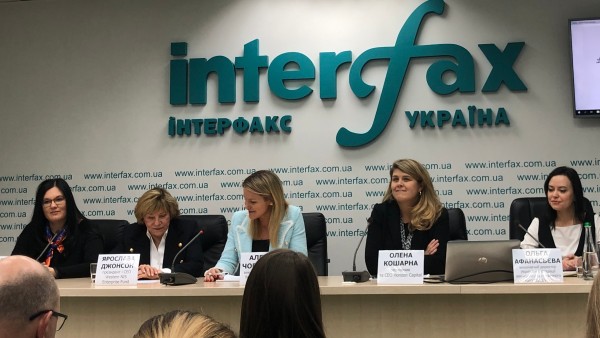
Women empowerment
"When I’m invited to a conference or asked to participate as a speaker, I always ask for the number of female speakers at the event," says Lenna Koszarny.
And this is something you are personally committed to. For example, you are a member of the Private Equity Women Investor Network (PEWIN). How does that help your cause?
Networking is critical in this industry. When 90 per cent of the leaders are men, then you have all-male networks that stretch decades. PEWIN is about women networking with other women. So we know each others names, we know who we are. We talk about private equity, about trends, emerging markets, about our personal goals and ambitions. It’s a great networking opportunity. I have made a tremendous amount of contacts that way.
You also advocate for Ukrainian women to export. How do you do that and why?
For Ukraine, exports are critical. Trade with EU is a natural opportunity, already used by many, as Ukraine‘s goods‘ exports grew some 16 per cent last year. What I am trying to do is to encourage women who have started small and medium-sized businesses to focus beyond their domestic markets, to also think about exporting. For example, Genesis, an IT company that we have invested in through the EEGF III, the fund that DEG participates in. Genesis has launched a top-5 health care application in the United States called BetterMe. It was created and led by a woman, Victoria Repa, who receives full support from founders and investors.
Do you feel like a role model for other women?
You know, being a role model is very passive. I can live my life and say: I am a role model. Right? Being an advocate is more action-oriented and I like to say that I am an advocate.
We provide financing
The limited supply of equity capital for medium-sized companies in Ukraine is a major obstacle to growth. This is where the Emerging Europe Growth Fund III of Horizon Capital comes in. The fund focuses mainly on export-dominated industries. DEG - Deutsche Investitions- und Entwicklungsgesellschaft mbH has invested ten million US dollars in the EEGF III fund.
Learn moreIn what ways?
Where I see glass ceilings, I break them. For example: I was asked to be the chair of the American Chamber of Commerce. Well, I am a busy person. I could have said: You know what, I don’t have the time. But I said: I would do it because I want other females throughout the country to look at that and say: Wow! This is the first time in 26 years that a woman is Chair of the Board of Directors of the American Chamber of Commerce, which is a very influential organisation here in Ukraine.
It sounds like being an advocate is part of your career.
That’s right. I am advocating for more women to be on the Board of the American Chamber of Commerce in Ukraine. I am advocating for more women to export and lead businesses. I am advocating for more women to build their career within private equity. That’s what I see as part of my role. When I am asked to be on a conference or I am asked to say a speech, I ask them: How many women will be speaking at this event? How many will be on the panel? I suggest great women whose voice should be heard because if the plan is to have only men, I am not interested.
Perception and reality
Ukraine is viewed by many potential investors through the prism of conflict with Russia. Yet the conflict zone comprises only seven per cent of Ukraine’s territory. Investors who know the country are capitalizing on its cost advantages, proximity to Europe and its talent pool. Ukraine is the fourth most educated nation in the world, more than seventy per cent of the people have a second degree.
How do people react when you speak out like that. Men must be threatened by you!
I don’t think that I am a threat to people. Certainly no one has said that to me. I have my mission. I am doing what I am doing, I am executing my plan, I’ve got my goals and I am not dictating what anyone else does with their life. I really don’t even think about it. I just go down my path and part of it is that I try to advocate for women. I understand that I am a rarity. I have a responsibility to advocate for women and I try to act responsibly in all the situations that I am in.
Being a rarity requires strength. What made you a strong woman?
Definitely the way that I was raised. I remember my mother always saying that you need to have your own independence, your own money, your own career. And that was different for the time. I was born in 1969, I am a twin sister and the two of us were raised that we could do anything that we wanted to do. For us it was ”sky is the limit“. Work hard, get good grades and do whatever your passion is. So my sister went into engineering. Only four per cent of her class were women. And I went into business. And I have never looked back.
Published on KfW Stories: Tuesday, 5 March 2019

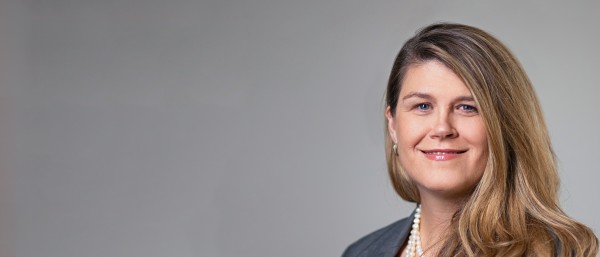
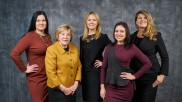
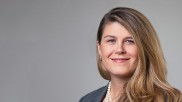




Data protection principles
If you click on one of the following icons, your data will be sent to the corresponding social network.
Privacy information